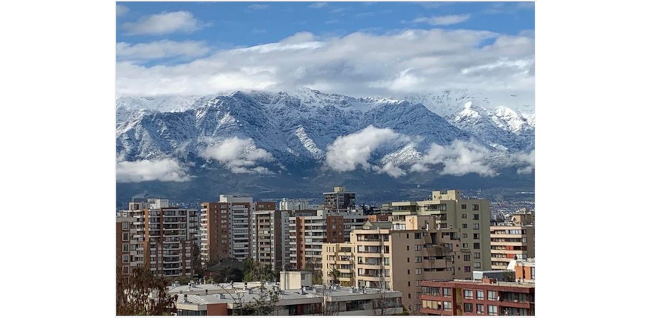My InterNations Experience — Meet the Instagram Contest Winner
In September, we celebrated our 15th anniversary and we asked you to share your favorite InterNations experience with us on Instagram. We have finally picked a winner!
Lesley Stones joined InterNations to make settling in abroad easier. This is also how she found her support system in Santiago de Chile. Her beautiful photo perfectly captures her new home abroad and the breathtaking vista of the Andes in the background.

We took a moment to talk to Lesley about her InterNations experience and her journey of living abroad.
When did you first move abroad and why?
It's a terrible feeling to wake up one day and realise that you have absolutely nothing to do. I was about 55 when that happened, and I was working as a freelance journalist in South Africa. I'd spent 12 wonderful years specialising in writing about travel, the theatre, and other things that interested me. Then the COVID-19 pandemic swept across the country, so there was no travel and no theatre. Many magazines and newspapers were forced out of business or slashed their budgets and stopped buying articles.
I could see a scary future where I did a little less work and became a little less relevant every year, and I was too young to accept that. So I analysed my options and hatched a genius plan to move overseas and teach conversational English to business people in Santiago. That wasn't just a random decision — I'd spent a few days in Santiago several years ago on a 5-week holiday through Latin America, and really loved the city. I'd even seen an advert in a shop window for an English teacher and joked about applying!
To turn that dream into reality I retrained as a TEFL (Teaching English as a Foreign Language) teacher. After I qualified, one of the first job alerts that my TEFL academy sent me was to teach conversational English to businesspeople in Santiago. A goosebump moment!
When did you join InterNations and how did you find about it?
As a journalist, I first heard about InterNations when a newspaper in Johannesburg commissioned me to write about the local branch of the organisation. I went to one of their meetings in a Hard Rock Cafe and interviewed a few of the members. I ended up staying friends with one of the women I met that evening.
A few years later a friend of mine moved to Tbilisi in Georgia and made some friends through InterNations. So I joined the branch in Santiago as soon as I arrived, hoping it would deliver an instant social life!
What makes your InterNations Community special?
Maybe the Santiago branch of InterNations is a little different from that in other countries, because most of the members here are local people. Some of them have worked abroad, or want to live abroad, but a lot of them just want a wider circle of friends. That was surprising but it's also great, because it means I'm meeting people who know the country and the best local hangouts! I've also met other expats, of course, and it's great to be able to meet up with people in a similar situation to swap stories, experiences, and advice.
What impact has being an InterNations member made on your life?
For me, the most daunting thing about moving abroad is the potential loneliness. I've emigrated twice before, but I was married then, so there were two of us. This time I wasn't looking forward to endless evenings spent by myself in my little apartment. It hasn't happened. The first weekend I was here, I joined an InterNations day trip to a vineyard.
The Santiago branch is very active so there's usually at least one event a week, and often more. I love that I can walk into a bar or restaurant in my new city and just start talking to anyone because we're all part of the same group.
What is one piece of advice you would give to someone who is about to move abroad for the first time?
Do your research and find an area to live that suits you — if you want to be active, look for somewhere near local transportation and the social life. Oh, and try to learn the language first — Chilean Spanish is notorious for being the worst version of Spanish in Latin America, but being able to speak to people is essential when you're trying to make friends, find your way around, rent an apartment, fill in forms, figure out the banking system, the transport system, the health system... Si, es muy importante poder hablar el idioma local!










